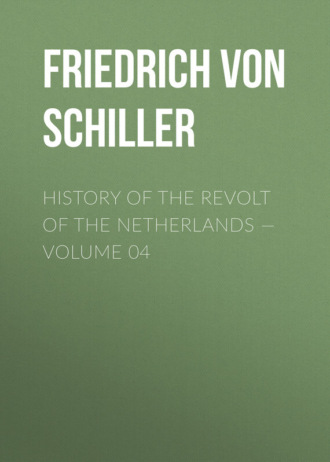
Фридрих Шиллер
History of the Revolt of the Netherlands — Volume 04
CIVIL WAR
1566. Meanwhile the regent hastened to take advantage of the schism amongst the nobles to complete the ruin of the league, which was already tottering under the weight of internal dissensions. Without loss of time she drew from Germany the troops which Duke Eric of Brunswick was holding in readiness, augmented the cavalry, and raised five regiments of Walloons, the command of which she gave to Counts Mansfeld, Megen, Aremberg, and others. To the prince, likewise, she felt it necessary to confide troops, both because she did not wish, by withholding them pointedly, to insult him, and also because the provinces of which he was governor were in urgent need of them; but she took the precaution of joining with him a Colonel Waldenfinger, who should watch all his steps and thwart his measures if they appeared dangerous. To Count Egmont the clergy in Flanders paid a contribution of forty thousand gold florins for the maintenance of fifteen hundred men, whom he distributed among the places where danger was most apprehended. Every governor was ordered to increase his military force, and to provide himself with ammunition. These energetic preparations, which were making in all places, left no doubt as to the measures which the regent would adopt in future. Conscious of her superior force, and certain of this important support, she now ventured to change her tone, and to employ quite another language with the rebels. She began to put the most arbitrary interpretation on the concessions which, through fear and necessity, she had made to the Protestants, and to restrict all the liberties which she had tacitly granted them to the mere permission of their preaching. All other religious exercises and rites, which yet appeared to be involved in the former privilege, were by new edicts expressly forbidden, and all offenders in such matters were to be proceeded against as traitors. The Protestants were permitted to think differently from the ruling church upon the sacrament, but to receive it differently was a crime; baptism, marriage, burial, after their fashion, were probibited under pain of death. It was a cruel mockery to allow them their religion, and forbid the exercise of it; but this mean artifice of the regent to escape from the obligation of her pledged word was worthy of the pusillanimity with which she had submitted to its being extorted from her. She took advantage of the most trifling innovations and the smallest excesses to interrupt the preachings; and some of the preachers, under the charge of having performed their office in places not appointed to them, were brought to trial, condemned, and executed. On more than one occasion the regent publicly declared that the confederates had taken unfair advantage of her fears, and that she did not feel herself bound by an engagement which had been extorted from her by threats.
Of all the Belgian towns which had participated in the insurrection of the Iconoclasts none had caused the regent so much alarm as the town of Valenciennes, in Hainault. In no other was the party of the Calvinists so powerful, and the spirit of rebellion for which the province of Hainault had always made itself conspicuous, seemed to dwell here as in its native place. The propinquity of France, to which, as well by language as by manners, this town appeared to belong, rather than to the Netherlands, had from the first led to its being governed with great mildness and forbearance, which, however, only taught it to feel its own importance. At the last outbreak of the church-desecrators it had been on the point of surrendering to the Huguenots, with whom it maintained the closest understanding. The slightest excitement night renew this danger. On this account Valenciennes was the first town to which the regent proposed, as soon as should be in her power, to send a strong garrison. Philip of Noircarmes, Baron of St. Aldegonde, Governor of Hainault in the place of the absent Marquis of Bergen, had received this charge, and now appeared at the head of an army before its walls. Deputies came to meet him on the part of the magistrate from the town, to petition against the garrison, because the Protestant citizens, who were the superior number, had declared against it. Noircarnes acquainted them with the will of the regent, and gave them the choice between the garrison or a siege. He assured them that not more than four squadrons of horse and six companies of foot should be imposed upon the town; and for this he would give them his son as a hostage. These terms were laid before the magistrate, who, for his part, was much inclined to accept them. But Peregrine Le Grange, the preacher, and the idol of the populace, to whom it was of vital importance to prevent a submission of which he would inevitably become the victim, appeared at the head of his followers, and by his powerful eloquence excited the people to reject the conditions. When their answer was brought to Noircarmes, contrary to all law of nations, he caused the messengers to be placed in irons, and carried them away with him as prisoners; he was, however, by express command of the regent, compelled to set them free again. The regent, instructed by secret orders from Madrid to exercise as much forbearance as possible, caused the town to be repeatedly summoned to receive the garrison; when, however, it obstinately persisted in its refusal, it was declared by public edict to be in rebellion, and Noircarmes was authorized to commence the siege in form. The other provinces were forbidden to assist this rebellious town with advice, money, or arms. All the property contained in it was confiscated. In order to let it see the war before it began in earnest, and to give it time for rational reflection, Noircarmes drew together troops from all Hainault and Cambray (1566), took possession of St. Amant, and placed garrisons in all adjacent places.
The line of conduct adopted towards Valenciennes allowed the other towns which were similarly situated to infer the fate which was intended for them also, and at once put the whole league in motion. An army of the Gueux, between three thousand and four thousand strong, which was hastily collected from the rabble of fugitives, and the remaining bands of the Iconoclasts, appeared in the territories of Tournay and Lille, in order to secure these two towns, and to annoy the enemy at Valenciennes. The commandant of Lille was fortunate enough to maintain that place by routing a detachment of this army, which, in concert with the Protestant inhabitants, had made an attempt to get possession of it. At the same time the army of the Gueux, which was uselessly wasting its time at Lannoy, was surprised by Noircarmes and almost entirely annihilated. The few who with desperate courage forced their way through the enemy, threw themselves into the town of Tournay, which was immediately summoned by the victor to open its gates and admit a garrison. Its prompt obedience obtained for it a milder fate. Noircarmes contented himself with abolishing the Protestant consistory, banishing the preachers, punishing the leaders of the rebels, and again re-establishing the Roman Catholic worship, which he found almost entirely suppressed. After giving it a steadfast Roman Catholic as governor, and leaving in it a sufficient garrison, he again returned with his victorious army to Valenciennes to press the siege.
This town, confident in its strength, actively prepared for defence, firmly resolved to allow things to come to extremes before it surrendered. The inhabitants had not neglected to furnish themselves with ammunition and provisions for a long siege; all who could carry arms (the very artisans not excepted), became soldiers; the houses before the town, and especially the cloisters, were pulled down, that the besiegers might not avail themselves of them to cover their attack. The few adherents of the crown, awed by the multitude, were silent; no Roman Catholic ventured to stir himself. Anarchy and rebellion had taken the place of good order, and the fanaticism of a foolhardy priest gave laws instead of the legal dispensers of justice. The male population was numerous, their courage confirmed by despair, their confidence unbounded that the siege would be raised, while their hatred against the Roman Catholic religion was excited to the highest pitch. Many had no mercy to expect; all abhorred the general thraldom of an imperious garrison. Noircarmes, whose army had become formidable through the reinforcements which streamed to it from all quarters, and was abundantly furnished with all the requisites for a long blockade, once more attempted to prevail on the town by gentle means, but in vain. At last he caused the trenches to be opened and prepared to invest the place.
In the meanwhile the position of the Protestants had grown as much worse as that of the regent had improved. The league of the nobles had gradually melted away to a third of its original number. Some of its most important defenders, Count Egmont, for instance, had gone over to the king; the pecuniary contributions which had been so confidently reckoned upon came in but slowly and scantily; the zeal of the party began perceptibly to cool, and the close of the fine season made it necessary to discontinue the public preachings, which, up to this time, had been continued. These and other reasons combined induced the declining party to moderate its demands, and to try every legal expedient before it proceeded to extremities. In a general synod of the Protestants, which was held for this object in Antwerp, and which was also attended by some of the confederates, it was resolved to send deputies to the regent to remonstrate with her upon this breach of faith, and to remind her of her compact. Brederode undertook this office, but was obliged to submit to a harsh and disgraceful rebuff, and was shut out of Brussels. He had now recourse to a written memorial, in which, — in the name of the whole league, he complained that the duchess had, by violating her word, falsified in sight of all the Protestants the security given by the league, in reliance on which all of them had laid down their arms; that by her insincerity she had undone all the good which the confederates had labored to effect; that she had sought to degrade the league in the eyes of the people, had excited discord among its members, and had even caused many of them to be persecuted as criminals. He called upon her to recall her late ordinances, which deprived the Protestants of the free exercise of their religion, but above all to raise the siege of Valenciennes, to disband the troops newly enlisted, and ended by assuring her that on these conditions and these alone the league would be responsible for the general tranquillity.
To this the regent replied in a tone very different from her previous moderation. "Who these confederates are who address me in this memorial is, indeed, a mystery to me. The confederates with whom I had formerly to do, for ought I know to the contrary, have dispersed. All at least cannot participate in this statement of grievances, for I myself know of many, who, satisfied in all their demands, have returned to their duty. But still, whoever he may be, who without authority and right, and without name addresses me, he has at least given a very false interpretation to my word if he asserts that I guaranteed to the Protestants complete religious liberty. No one can be ignorant how reluctantly I was induced to permit the preachings in the places where they had sprung up unauthorized, and this surely cannot be counted for a concession of freedom in religion. Is it likely that I should have entertained the idea of protecting these illegal consistories, of tolerating this state within a state? Could I forget myself so far as to grant the sanction of law to an objectionable sect; to overturn all order in the church and in the state, and abominably to blaspheme my holy religion? Look to him who has given you such permission, but you must not argue with me. You accuse me of having violated the agreement which gave you impunity and security. The past I am willing to look over, but not what may be done in future. No advantage was to be taken of you on account of the petition of last April, and to the best of my knowledge nothing of the kind has as yet been done; but whoever again offends in the same way against the majesty of the king must be ready to bear the consequences of his crime. In fine, how can you presume to remind me of an agreement which you have been the first to break? At whose instigation were the churches plundered, the images of the saints thrown down, and the towns hurried into rebellion? Who formed alliances with foregn powers, set on foot illegal enlistments, and collected unlawful taxes from the subjects of the king? These are the reasons which have impelled me to draw together my troops, and to increase the severity of the edicts. Whoever now asks me to lay down my arms cannot mean well to his country or his king, and if ye value your own lives, look to it that your own actions acquit you, instead of judging mine."
All the hopes which the confederates might have entertained of an amicable adjustment sank with this high-toned declaration. Without being confident of possessing powerful support, the regent would not, they argued, employ such language. An army was in the field, the enemy was before Valenciennes, the members who were the heart of the league had abandoned it, and the regent required unconditional submission. Their cause was now so bad that open resistance could not make it worse. If they gave themselves up defenceless into the hands of their exasperated sovereign their fate was certain; an appeal to arms could at least make it a matter of doubt; they, therefore, chose the latter, and began seriously to take steps for their defence. In order to insure the assistance of the German Protestants, Louis of Nassau attempted to persuade the towns of Amsterdam, Antwerp, Tournay, and Valenciennes to adopt the confession of Augsburg, and in this manner to seal their alliance with a religious union. But the proposition was not successful, because the hatred of the Calvinists to the Lutherans exceeded, if possible, that which they bore to popery. Nassau also began in earnest to negotiate for supplies from France, the Palatinate, and Saxony. The Count of Bergen fortified his castles; Brederode threw himself with a small force into his strong town of Vianne on the Leek, over which he claimed the rights of sovereignty, and which he hastily placed in a state of defense, and there awaited a reinforcement from the league, and the issue of Nassua's negotiations. The flag of war was now unfurled, everywhere the drum was heard to beat; in all parts troops were seen on the march, contributions collected, and soldiers enlisted. The agents of each party often met in the same place, and hardly had the collectors and recruiting officers of the regent quitted a town when it had to endure a similar visit from the agents of the league.
From Valenciennes the regent directed her attention to Herzogenbusch, where the Iconoclasts had lately committed fresh excesses, and the party of the Protestants had gained a great accession of strength. In order to prevail on the citizens peaceably to receive a garrison, she sent thither, as ambassador, the Chancellor Scheiff, from Brabant, with counsellor Merode of Petersheim, whom she appointed governor of the town; they were instructed to secure the place by judicious means, and to exact from the citizens a new oath of allegiance. At the same time the Count of Megen, who was in the neighborhood with a body of troops, was ordered to support the two envoys in effecting their commission, and to afford the means of throwing in a garrison immediately. But Brederode, who obtained information of these movements in Viane, had already sent thither one of his creatures, a certain Anton von Bomber, — a hot Calvinist, but also a brave soldier, in order to raise the courage of his party, and to frustrate the designs of the regent. This Bomberg succeeded in getting possession of the letters which the chancellor brought with him from the duchess, and contrived to substitute in their place counterfeit ones, which, by their harsh and imperious language, were calculated to exasperate the minds of the citizens. At the same time he attempted to throw suspicion on both the ambassadors of the duchess as having evil designs upon the town. In this he succeeded so well with the mob that in their mad fury they even laid hands on the ambassadors and placed them in confinement. He himself, at the head of eight thousand men, who had adopted him as their leader, advanced against the Count of Megen, who was moving in order of battle, and gave him so warm a reception, with some heavy artillery, that he was compelled to retire without accomplishing his object. The regent now sent an officer of justice to demand the release of her ambassadors, and in case of refusal to threaten the place with siege; but Bomberg with his party surrounded the town hall and forced the magistrate to deliver to him the key of the town. The messenger of the regent was ridiculed and dismissed, and an answer sent through him that the treatment of the prisoners would depend upon Brederode's orders. The herald, who was remaining outside before the town, now appeared to declare war against her, which, however, the chancellor prevented.
After his futile attempt on Herzogenhusch the Count of Megen threw himself into Utrecht in order to prevent the execution of a design which Count Brederode had formed against that town. As it had suffered much from the army of the confederates, which was encamped in its immediate neighborhood, near Viane, it received Megen with open arms as its protector, and conformed to all the alterations which he made in the religious worship. Upon this he immediately caused a redoubt to be thrown up on the bank of the Leek, which would command Viane. Brederode, not disposed to await his attack, quitted that rendezvous with the best part of his army and hastened to Amsterdam.
However unprofitably the Prince of Orange appeared to be losing his time in Antwerp during these operations he was, nevertheless, busily employed. At his instigation the league had commenced recruiting, and Brederode had fortified his castles, for which purpose he himself presented him with three cannons which he had had cast at Utrecht. His eye watched all the movements of the court, and he kept the league warned of the towns which were next menaced with attack. But his chief object appeared to be to get possession of the principal places in the districts under his own government, to which end he with all his power secretly assisted Brederode's plans against Utrecht and Amsterdam. The most important place was the Island of Walcheren, where the king was expected to land; and he now planned a scheme for the surprise of this place, the conduct of which was entrusted to one of the confederate nobles, an intimate friend of the Prince of Orange, John of Marnix, Baron of Thoulouse, and brother of Philip of Aldegonde.
1567. Thoulouse maintained a secret understanding with the late mayor of Middleburg, Peter Haak, by which he expected to gain an opportunity of throwing a garrison into Middleburg and Flushing. The recruiting, however, for this undertaking, which was set on foot in Antwerp, could not be carried on so quietly as not to attract the notice of the magistrate. In order, therefore, to lull the suspicions of the latter, and at the same time to promote the success of the scheme, the prince caused the herald by public proclamation to order all foreign soldiers and strangers who were in the service of the state, or employed in other business, forthwith to quit the town. He might, say his adversaries, by closing the gates have easily made himself master of all these suspected recruits; but be expelled them from the town in order to drive them the more quickly to the place of their destination. They immediately embarked on the Scheldt, and sailed down to Rammekens; as, however, a marketvessel of Antwerp, which ran into Flushing a little before them had given warning of their design they were forbidden to enter the port. They found the same difficulty at Arnemuiden, near Middleburg, although the Protestants in that place exerted themselves to raise an insurrection in their favor. Thoulouse, therefore, without having accomplished anything, put about his ships and sailed back down the Scheldt as far as Osterweel, a quarter of a mile from Antwerp, where he disembarked his people and encamped on the shore, with the hope of getting men from Antwerp, and also in order to revive by his presence the courage of his party, which had been cast down by the proceedings of the magistrate. By the aid of the Calvinistic clergy, who recruited for him, his little army increased daily, so that at last he began to be formidable to the Antwerpians, whose whole territory he laid waste. The magistrate was for attacking him here with the militia, which, however, the Prince of Orange successfully opposed by the, pretext that it would not be prudent to strip the town of soldiers.
Meanwhile the regent had hastily brought together a small army under the command of Philip of Launoy, which moved from Brussels to Antwerp by forced marches. At the same time Count Megen managed to keep the army of the Gueux shut up and employed at Viane, so that it could neither hear of these movements nor hasten to the assistance of its confederates. Launoy, on his arrival attacked by surprise the dispersed crowds, who, little expecting an enemy, had gone out to plunder, and destroyed them in one terrible carnage. Thoulouse threw himself with the small remnant of his troops into a country house, which had served him as his headquarters, and for a long time defended himself with the courage of despair, until Launoy, finding it impossible to dislodge him, set fire to the house. The few who escaped the flames fell on the swords of the enemy or were drowned in the Scheldt. Thoulouse himself preferred to perish in the flames rather than to fall into the hands of the enemy. This victory, which swept off more than a thousand of the enemy, was purchased by the conqueror cheaply enough, for he did not lose more than two men. Three hundred of the leaguers who surrendered were cut down without mercy on the spot, as a sally from Antwerp was momentarily dreaded.
Before the battle actually commenced no anticipation of such an event had been entertained at Antwerp. The Prince of Orange, who had got early information of it, had taken the precaution the day before of causing the bridge which unites the town with Osterweel to be destroyed, in order, as he gave out, to prevent the Calvinists within the town going out to join the army of Thoulouse. A more probable motive seems to have been a fear lest the Catholics should attack the army of the Gueux general in the rear, or lest Launoy should prove victorious, and try to force his way into the town. On the same pretext the gates of the city were also shut by his orders, arnd the inhabitants, who did not comprehend the meaning of all these movements, fluctuated between curiosity and alarm, until the sound of artillery from Osterweel announced to them what there was going on. In clamorous crowds they all ran to the walls and ramparts, from which, as the wind drove the smoke from the contending armies, they commanded a full view of the whole battle. Both armies were so near to the town that they could discern their banners, and clearly distinguish the voices of the victors and the vanquished. More terrible even than the battle itself was the spectacle which this town now presented. Each of the conflicting armies had its friends and its enemies on the wall. All that went on in the plain roused on the ramparts exultation or dismay; on the issue of the conflict the fate of each spectator seemed to depend. Every movement on the field could be read in the faces of the townsmen; defeat and triumph, the terror of the conquered, and the fury of the conqueror. Here a painful but idle wish to support those who are giving way, to rally those who fly; there an equally futile desire to overtake them, to slay them, to extirpate them. Now the Gueux fly, and ten thousand men rejoice; Thoulouse's last place and refuge is in flames, and the hopes of twenty thousand citizens are consumed with him.
But the first bewilderment of alarm soon gave place to a frantic desire of revenge. Shrieking aloud, wringing her hands and with dishevelled hair, the widow of the slain general rushed amidst the crowds to implore their pity and help. Excited by their favorite preacher, Hermann, the Calvinists fly to arms, determined to avenge their brethren, or to perish with them; without reflection, without plan or leader, guided by nothing but their anguish, their delirium, they rush to the Red Gate of the city which leads to the field of battle; but there is no egress, the gate is shut and the foremost of the crowd recoil on those that follow. Thousands and thousands collect together, a dreadful rush is made to the Meer Bridge. We are betrayed! we are prisoners! is the general cry. Destruction to the papists, death to him who has betrayed us! — a sullen murmur, portentous of a revolt, runs through the multitude. They begin to suspect that all that has taken place has been set on foot by the Roman Catholics to destroy the Calvinists. They had slain their defenders, and they would now fall upon the defenceless. With fatal speed this suspicion spreads through the whole of Antwerp. Now they can, they think, understand the past, and they fear something still worse in the background; a frightful distrust gains possession of every mind. Each party dreads the other; every one sees an enemy in his neighbor; the mystery deepens the alarm and horror; a fearful condition for a populous town, in which every accidental concourse instantly becomes tumult, every rumor started amongst them becomes a fact, every small spark a blazing flame, and by the force of numbers and collision all passions are furiously inflamed. All who bore the name of Calvinists were roused by this report. Fifteen thousand of them take possession of the Meer Bridge, and plant heavy artillery upon it, which they had taken by force from the arsenal; the same thing also happens at another bridge; their number makes them formidable, the town is in their hands; to escape an imaginary danger they bring all Antwerp to the brink of ruin.
Immediately on the commencement of the tumult the Prince of Orange hastened to the Meer Bridge, where, boldly forcing his way through the raging crowd, he commanded peace and entreated to be heard. At the other bridge Count Hogstraten, accompanied by the Burgomaster Strahlen, made the same attempt; but not possessing a sufficient share either of eloquence or of popularity to command attention, he referred the tumultuous crowd to the prince, around whom all Antwerp now furiously thronged. The gate, he endeavored to explain to them, was shut simply to keep off the victor, whoever he might be, from the city, which would otherwise become the prey of an infuriated soldiery. In vain! the frantic people would not listen, and one more daring than the rest presented his musket at him, calling him a traitor. With tumultuous shouts they demanded the key of the Red Gate, which he was ultimately forced to deliver into the hands of the preacher Hermann. But, he added with happy presence of mind, they must take heed what they were doing; in the suburbs six hundred of the enemy's horse were waiting to receive them. This invention, suggested by the emergency, was not so far removed from the truth as its author perhaps imagined; for no sooner had the victorous general perceived the commotion in Antwerp than he caused his whole cavalry to mount in the hope of being able, under favor of the disturbance, to break into the town. I, at least, continued the Prince of Orange, shall secure my own safety in time, and he who follows my example will save himself much future regret. These words opportunely spoken and immediately acted upon had their effect. Those who stood nearest followed him, and were again followed by the next, so that at last the few who had already hastened out of the city when they saw no one coming after them lost the desire of coping alone with the six hundred horse. All accordingly returned to the Meer Bridge, where they posted watches and videttes, and the night was passed tumultuously under arms.
The town of Antwerp was now threatened with fearful bloodshed and pillage. In this pressing emergency Orange assembled an extraordinary senate, to which were summoned all the best-disposed citizens of the four nations. If they wished, said he, to repress the violence of the Calvinists they must oppose them with an army strong enough and prepared to meet them. It was therefore resolved to arm with speed the Roman Catholic inhabitants of the town, whether natives, Italians, or Spaniards, and, if possible, to induce the Lutherans also to join them. The haughtiness of the Calvinists, who, proud of their wealth and confident in their numbers, treated every other religious party with contempt, had long made the Lutherans their enemies, and the mutual exasperation of these two Protestant churches was even more inmplacable than their common hatred of the dominant church. This jealousy the magistrate had turned to advantage, by making use of one party to curb the other, and had thus contrived to keep the Calvinists in check, who, from their numbers and insolence, were most to be feared. With this view, he had tacitly taken into his protection the Lutherans, as the weaker and more peaceable party, having moreover invited for them, from Germany, spiritual teachers, who, by controversial sermons, might keep up the mutual hatred of the two bodies. He encouraged the Lutherans in the vain idea that the king thought more favorably of their religious creed than that of the Calvinists, and exhorted them to be careful how they damaged their good cause by any understanding with the latter. It was not, therefore, difficult to bring about, for the moment, a union with the Roman Catholics and the Lutherans, as its object was to keep down their detested rivals. At dawn of day an army was opposed to the Calvinists which was far superior in force to their own. At the head of this army, the eloquence of Orange had far greater effect, and found far more attention than on the preceding evening, unbacked by such strong persuasion. The Calvinists, though in possession of arms and artillery, yet, alarmed at the superior numbers arrayed against them, were the first to send envoys, and to treat for an amicable adjustment of differences, which by the tact and good temper of the Prince of Orange, he concluded to the satisfaction of all parties. On the proclamation of this treaty the Spaniards and Italians immdiately laid down their arms. They were followed by the Calvinists, and these again by the Roman Catholics; last of all the Lutherans disarmed.







